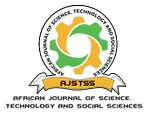Behavioural faecal exposure pathways in a nomadic lifestyle :
case study of Turbi Ward of Marsabit County
DOI:
https://doi.org/10.58506/ajstss.v2i2.179Keywords:
Sanitation, behavioral change, pastoralism, Wash.Abstract
Background: Water, sanitation and hygiene (WASH) is the cornerstone for health and growth at all stages of life in maintain health and increase in life span. Poor sanitation has led to disease increase in microorganisms such as Escherichia coli. Sanitation is influenced in a community by factors such as perception, behavioral practices such as open defecation and disposal of these waste. This study aimed to identify behavioral faecal exposure pathways in the nomadic community of Turbi ward.
Methods: Mixed method approach using qualitative and quantitative research methods was applied in this study to assess exposure pathways and related behavior among the nomadic community of Turbi ward. Thematic data analysis was used to analyze data generated from behavioural observations. Data was presented using graphs and pie charts.
Results: A total of 100 households were sampled and about 68% (n=100) of population use surface water for domestic. Turbi manyatta had the highest with 30% (n=100), followed by Kambi Nyoka at 16%(n=100) and the least was Shurr manyatta at 2% (n=100). Surface water was the dominant source of water for these community. About 76% (n=100) of the households did not treat their water before use for domestic purposes and due to scarcity of water the community store water in jerricans for more than one week. About 87% of the residents reported not washing hands before milking animals. Open defecation was the predominant method of waste disposal among the five selected Manyattas, accounting for 95% (n= 100). There was significant relationship between practicing open defecation and using surface water without treatment for domestic purpose at p-value 0.032 (95% CI), using Wilcoxon Signed-Rank test.
Conclusion: The study revealed that the study community’s behavioral practices exposes them to faecal exposure due to habitual practice of open defecation, throwing waste to the bush, open burning, drinking untreated surface water and not washing hands before milking animals. There is need for advocacy on social behavior change, and strategies on health promotion targeting Water, Sanitation and Hygiene (WASH).


